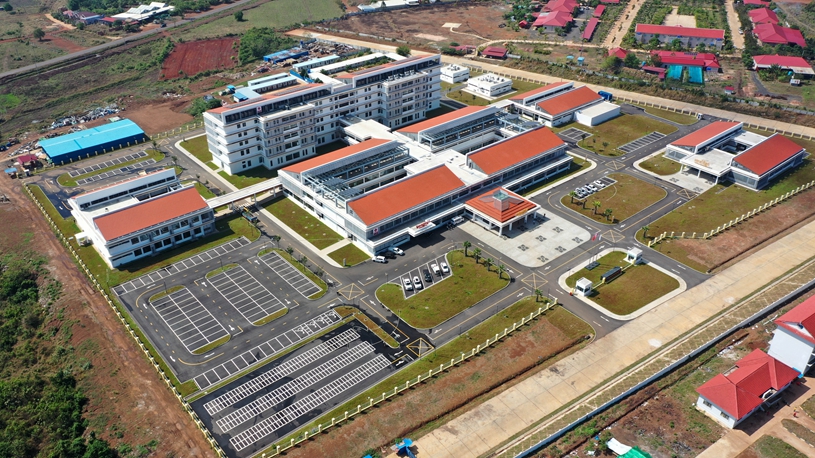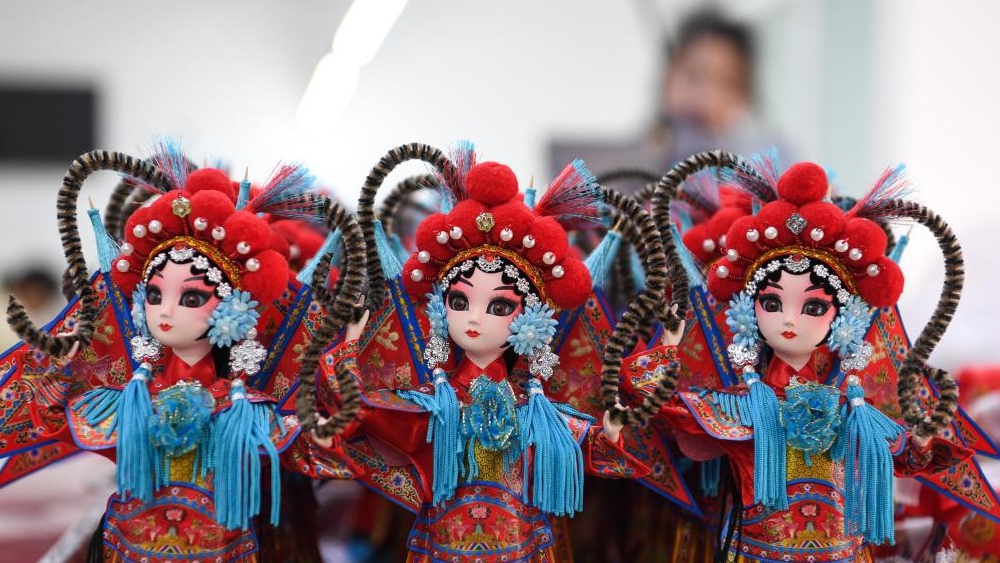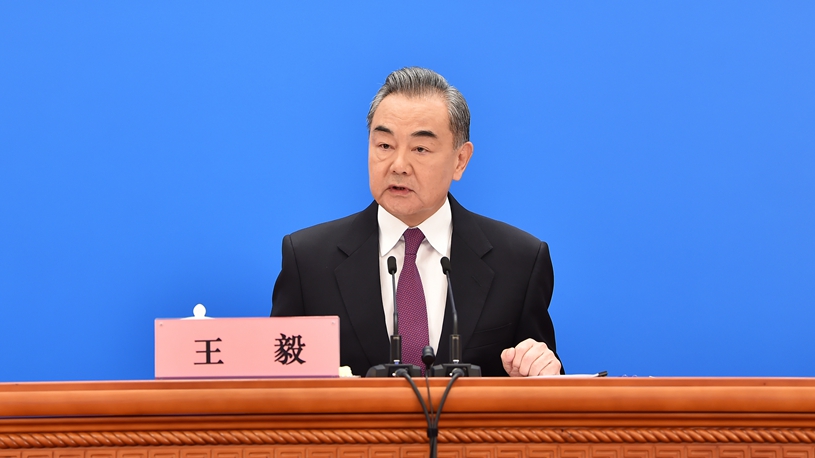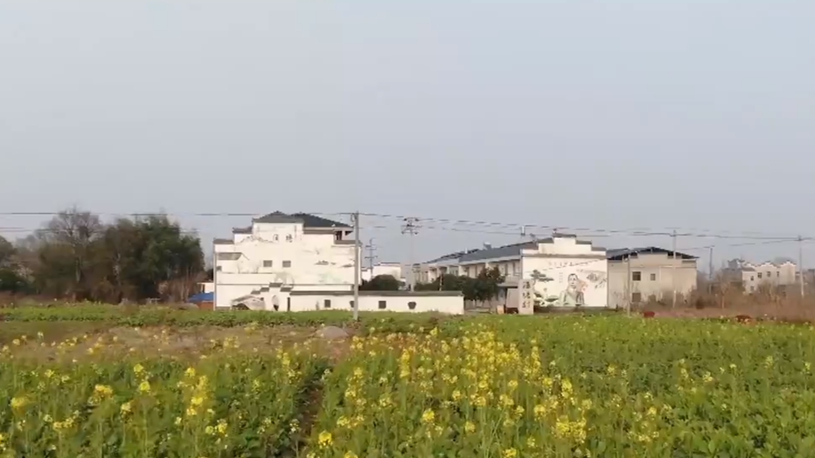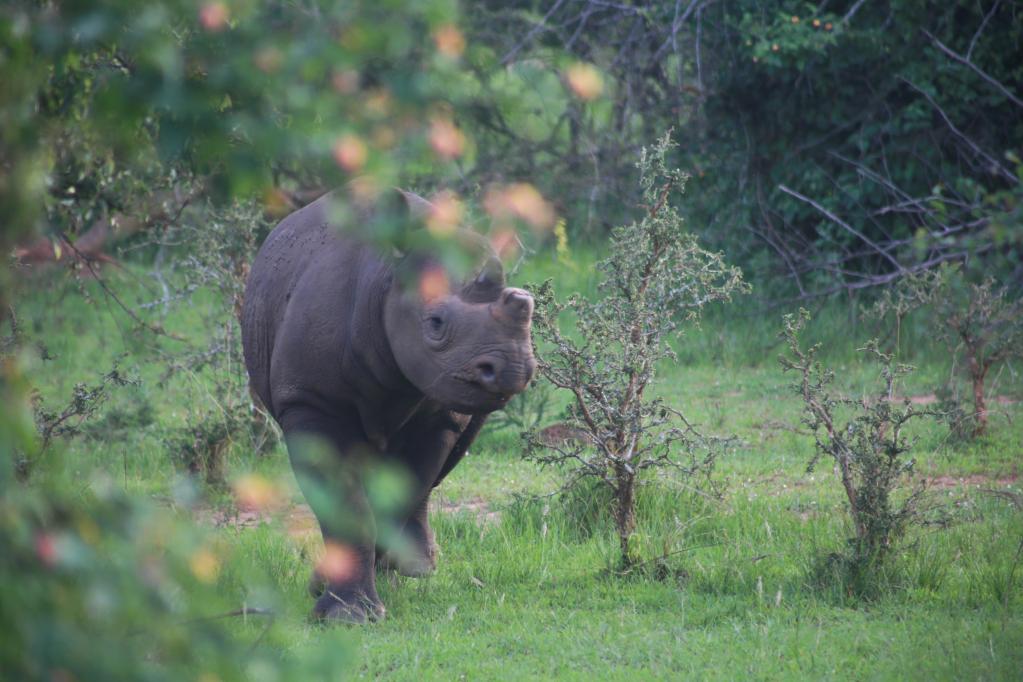
This file photo shows a rhinoceros is seen at Akagera National Park, eastern Rwanda, Nov. 16, 2019. (Xinhua/Lyu Tianran)
Rwanda, a landlocked country in East Africa with limited resources, has worked to find its niche in developing the local economy.
KIGALI, March 8 (Xinhua) -- New trailblazing conservation efforts are underway in Rwanda to protect the white rhinoceros and mountain gorillas from extinction while empowering local communities through ecotourism and boosting the landlocked nation's wildlife economy.
Rwanda, dubbed Africa's land of a thousand hills, is in the Great Rift Valley where the African Great Lakes region and East Africa converge. Its natural assets include four national parks, namely the Akagera National Park, Nyungwe National Park, Gishwati-Mukura National Park, and the Volcanoes National Park, and 23 lakes and rare species like the mountain gorillas.
The new conservation efforts have turned out to be sustainable in terms of generating long-term benefits for local communities and ensuring the survival of wildlife species in the future.
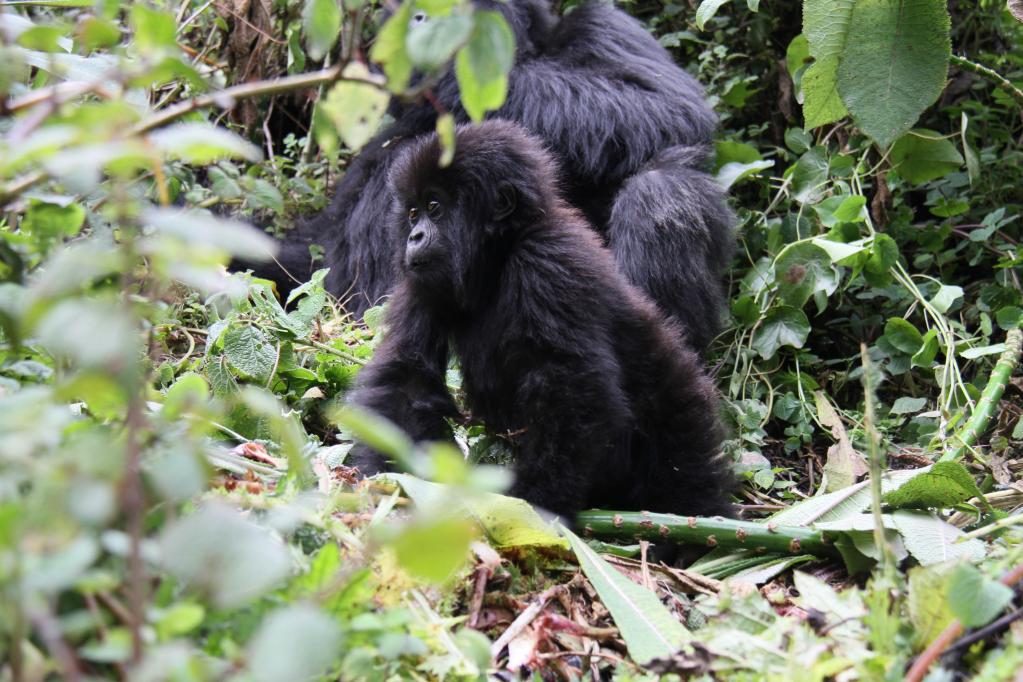
This file photo shows gorillas are seen at Volcanoes National Park in Rwanda, Oct. 8, 2016. (Xinhua/Yang Mengxi)
COMMUNITY ROLE IN MANAGEMENT OF AKAGERA NATIONAL PARK IN EASTERN RWANDA
Game-viewing in the Akagera National Park, Central Africa's largest protected wetland and the last remaining refuge for the Big Five -- lion, leopard, rhinoceros, elephant and buffalo -- in the country, has been a key tourist activity.
This wasn't always the case. In the aftermath of the 1994 genocide against the Tutsis, during which more than 1 million people were slaughtered by ethnic Hutu extremists in just 100 days, in addition to a devastating impact on the environment, the park was on the verge of being lost forever.
Fresh conservation efforts are being rolled out with the goal of generating long-term benefits for the local communities of Rwanda. Thirty white rhinos were introduced to Akagera National Park from a private game reserve in South Africa in November 2021, through a collaboration between partners including the Rwanda Development Board, and African Parks, with funding provided by the Howard G. Buffett Foundation.
The relocation was the largest ever undertaken and aimed at ensuring their survival into the future.
"Akagera National Park is a Rwandan treasure. It's one of the four national parks that we have in Rwanda and the most visited attraction in the country," Jean Paul Karinganire, deputy tourism and marketing manager of the Akagera Management Company (AMC), told Xinhua at his office inside the park. "Last year, our numbers showed that 51 percent of all visitors were Rwandans. This is really an important asset for the country. Economy-wise, Akagera contributes to the community, it's really critical. We have to engage them in our actions, they have to be decision-makers and our partners to understand the management of the park and how they can benefit from it."
"Ten percent of the tourism revenue is given to the community through a revenue-sharing scheme. And 5 percent of tourism revenue is also contributed to the community to what we call a special guarantee fund. It's a national fund that compensates losses from wildlife," Karinganire said.
The park currently employs 286 people, with 95 percent of them coming from the community. The 2021 aerial census resulted in more than 12,000 animals counted, up from less than 6,000 in 2010.
"The park is an amazing jewel that Rwanda has got. This is a huge boost to the economy of the country and a huge boost to us, the citizens of the country and the people who surround the park itself," tour guide Bachu Abdallah said.
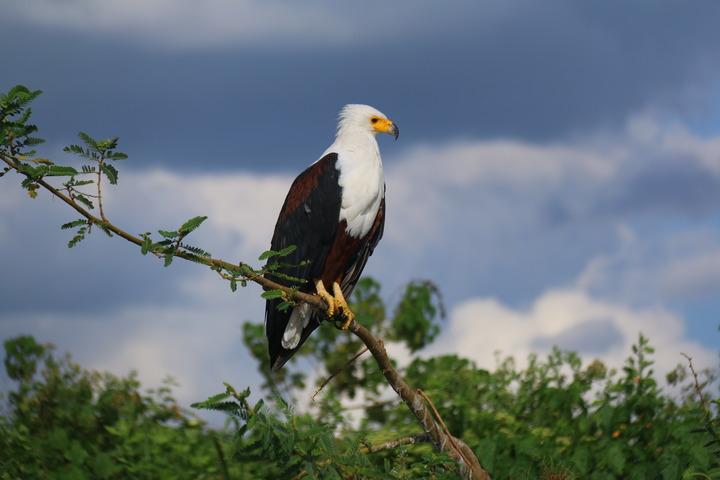
An African fish eagle is standing on a branch in Akagera National Park, Rwanda, on March 1, 2022. (Xinhua/Huang Wanqing)
Akagera National Park, which sits along the border with Tanzania, is about a three-hour drive from Kigali, Rwanda's capital. It was not immune to the COVID-19 pandemic.
As countries went on lockdown and international flights grounded to stop the spread of the coronavirus, the tourism sector became one of the hardest-hit sectors in Rwanda. Tour operators, hotel and lodge owners, food and transport suppliers all experienced significant losses.
"Before COVID in 2019, we had 50,000 visitors and around 2.6 million U.S. dollars of revenue. In 2020, we received 15,000 visitors and a revenue of around 1.2 million U.S. dollars. But we were glad that in 2021 the trend was going up again," Karinganire emphasized. "Tourism is the number one source of exchange for the country, helping people get jobs, opportunities for lodge and hotel owners, and marketing Rwanda globally. Because Rwanda was known for the genocide only. Now it's a country where you can see gorillas, you can see the Big Five, you can see chimpanzees."
Rwanda is now also aiming to establish itself as a regional and global hub for conferences and events and is scheduled to host the Commonwealth Heads of Government Meeting (CHOGM) during the week of June 20 in Kigali.
According to the International Monetary Fund (IMF), Rwanda's economy has rebounded strongly in 2021, and the recovery is expected to continue in 2022.
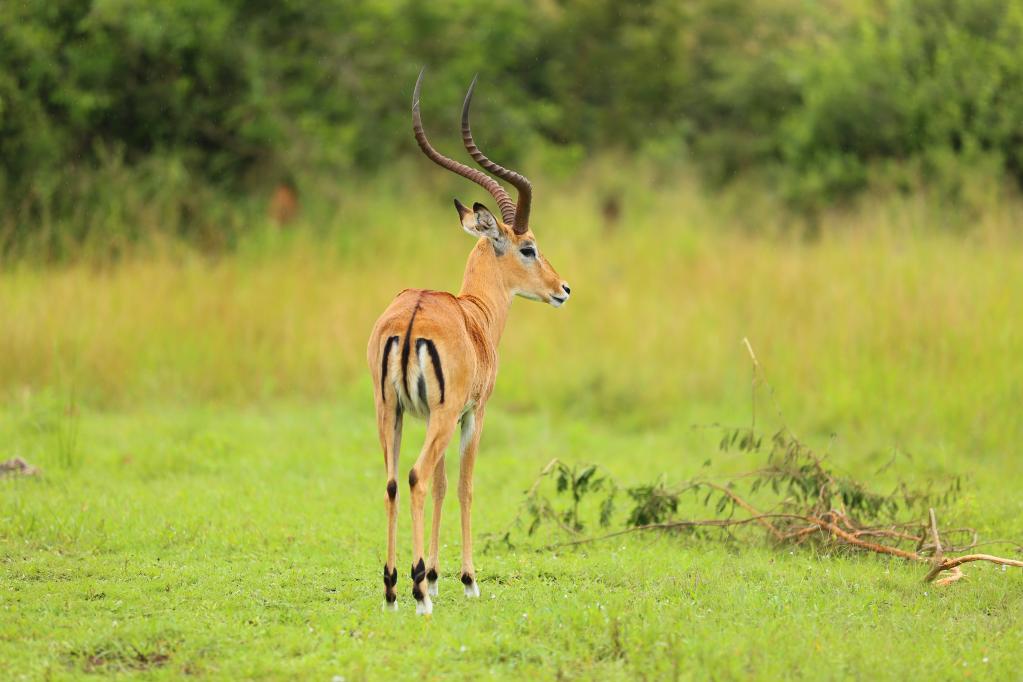
An impala is standing in Akagera National Park, Rwanda, on March 2, 2022. (Xinhua/Huang Wanqing)
SAVING THE MOUNTAIN GORILLAS
Elsewhere, the Volcanoes National Park in Musanze in the misty Virunga Mountains volcanic range is home to the critically endangered mountain gorillas which number only 1,000 remain in the wild. The park in the northwestern part of the country and covering an area of 16,000 hectares, is home to 364 mountain gorillas or 20 families according to the last census in 2018.
Protecting the primates and their habitat is a top priority, as they are at the heart of Rwanda's tourism industry after decades of habitat encroachment and poaching threatening their existence. Mountain gorilla tourism is also a key driver for economic growth and conservation.
The park has attracted tourists from all over the world for gorillas trekking and hiking in the misty mountains in hopes of coming to a close encounter with the silverbacks and their families. Due to the pandemic, tourists have been required to wear face masks to prevent a COVID transmission from humans to gorillas.
After a dramatic decline in numbers following their scientific discovery in 1902, new conservation initiatives are ensuring that mountain gorilla numbers are now slowly increasing.
"The mountain gorillas in Rwanda are so important to us as tour operators, and they are so important for the country because they bring foreign exchange," Olivier Kanyabikali, manager of Countryside Tours-Rwanda, told Xinhua. "The money paid by the tourists helps a lot in the conservation of the mountain gorillas and many other aspects of tourism and wildlife in Rwanda, and it also benefits local communities. They receive a certain percentage from the earnings from the mountain gorillas and tourism."
The area is also home to the Ellen DeGeneres Campus of the Dian Fossey Gorilla Fund which aims to tackle conservation challenges and ensure the survival of gorillas and their biodiverse forest home.
The mountain gorillas can only be found in three countries: Rwanda, Uganda and the Democratic Republic of the Congo. According to WWF International, the mountain gorilla population currently stands at approximately 1,004 individuals and its status is still endangered.
Tour guide Abdallah thinks otherwise. "For the future of Rwanda, I wish this country can do much better and better to develop other parts of the tourism attractive areas because we have several, not only the national parks," he said. ■

